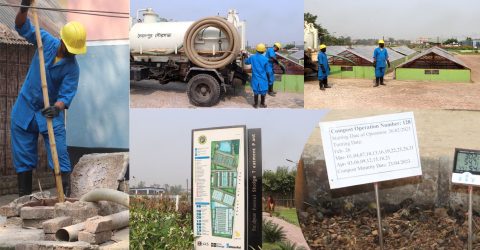
Pinky Akter : When coins are inserted into the ATM booth, fresh water comes out. But it is not that coin, it must be Mujib coin of two taka. A 2 taka mujib coin inserted into the ATM will yield two liters of fresh water.
This different water ATM has been installed in the 50-bed upazila health complex of Paikgacha, a marginal town on the south coast of the country. Fresh water scarcity is acute in the region due to salt water intensification. There was no provision of fresh water in this hospital for the patients and their relatives to drink. The local ‘Community Support Committee’ set up this novel water ATM to alleviate the unbearable water woes. In collaboration were non-governmental organizations WaterAid, Navloc, HSBC Water Program and local municipalities.
The project was launched on 25 November 2018. Since then, the patients and their relatives who come to the hospital have eased the problem of drinking water. Filtering safe water is easily available at low cost.
Upazila Health and Family Planning Officer Nitish Golkar, who is in charge of the hospital, said that due to this project, the people coming to the hospital are getting 100% safe water. Earlier there was no system of safe drinking water in this hospital. Tubewell water was salty and arsenic. For quite some time, drinking water was brought from the municipality, but when the water bill was sent to the concerned department, the bill was not passed. Complexity is created. Finally, the water crisis is resolved after the initiative of the locals and some non-governmental organizations.
President of the Community Support Committee and Mayor of Paikgacha Municipality Salim Jahangir said, “The saline crisis in Paikgacha is severe. There is salt everywhere in tube wells and ponds. Fresh water sources are scarce. The people of this region are struggling with water. Hospital patients and patients’ relatives suffer from lack of clean water. This project is a joint initiative of several parties to reduce that suffering. Through this, seasonal rain water is collected and filtered to make it suitable for human drinking. As a result, everyone is benefiting.
Yasin Arafat, program officer (engineering) of the non-governmental organization WaterAid, said, “Water is collected from the roof of the hospital building during the rainy season and filtered under special management and kept in a specific tank.” Then that tank remains in the water ATM from where people collect water. He said that a total of 39,000 liters of water can be collected in three tanks of 10,000 liters and 3 tanks of 3,000 liters. The engineer also said that this rain water is better than any other water. The water is made drinkable through special technology by filtering in several steps.
A person named Hasina Begum, who brought patients to the hospital, said that earlier they had to go outside for drinking water when they came to the hospital. No need to go out anymore. There is good water supply inside the hospital. Two liters of water is available for 2 taka. Hasina said that water from the water ATM here is better to drink and clean than the water available in Paikgacha market. Abul Hashem, Kabir Ahmad and Roksana Begum and others spoke positively about this water.
Hospitals on the Southwest Coast require a different arrangement:
The shortage of fresh water is not only in this Paikgacha. The rest of the upazilas of Khulna including Koira, Dakop and various areas including Satkhira, Bagerhat and Bhola are also in crisis. The tubewells in the hospital complexes in these areas have brackish water. Even if the other work is completed, it is ineligible for drinking.
There is a demand from the grassroots to have a different management for the hospitals in areas prone to saline crisis in terms of water management. Hospitalized patients and their relatives say the government can come up with a separate plan for this. There is no alternative without it.
Paikgacha Upazila Health and Family Planning Officer Nitish Golkar said, the context of these sub-district hospitals is different. There is an acute shortage of drinking water. Keeping this in mind concerned can take different plans. Paikgachar can adopt this project of 50-bed Upazila Health Complex as a model.
In this context, I spoke with Bahar Uddin, the supervising engineer of Khulna Circle of the Directorate of Public Health Engineering. He said, if there is a shortage of fresh water in a hospital, then an application can be made to the local government department or the local member of parliament regarding rainwater harvesting. If they want we can implement such projects there.
The engineer also said that a new project has come for rainwater harvesting in sub-urban areas. He said that fresh water can also be provided through this project.




